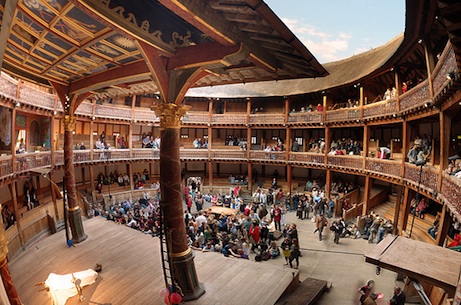
Kate Crowcroft is studying the reception of the Middle Ages in English Renaissance texts and the evolution of theological ideas about language and speech during this period.
Kate Crowcroft [2011] is fascinated by language. A poet, she is beginning a PhD in English focusing on the reception of the Middle Ages in English Renaissance texts and the evolution of theological ideas about language and speech during this period.
The research continues the theme of her MPhil when she studied how Protestant writers during the Reformation period referred back to Catholic writers to negotiate their own ideas about language and silence. Kate is particularly interested in how silence is gendered in their writing.
“I looked at Renaissance marriage conduct manuals where wives are instructed to be chaste, obedient and silent. A lot of writers especially playwrights like Shakespeare returned to medieval literature to fashion women who were not silent as a vehicle for political commentary,” she says. “This shows how thoughts about language were changing. Ideas of how words affect our social structures are emerging.”
Childhood
Kate’s interest in language and literature dates back to her early childhood. Born in Melbourne, she moved between Melbourne and Hong Kong until she was about 10 because her father had a business there. She says moving back and forth so much led her to retreat into books. “I took comfort there,” she says. Her grandmother read her Shakespeare as a young child and she started writing her own poetry at around six.
She says poetry opened up a new world to her. “It makes you see the world from new angles,” she says. “It gives you the space to think and change your perspective. I believe it has real power for activism and bringing about positive change in the world,” she says.
Kate’s parents took her out of primary school when the family were in Hong Kong and she was homeschooled there by her mother, a scientist.
Her family eventually moved back to Melbourne and Kate attended secondary school there. She hated her first school and nearly left at 16. “I had a bit of an issue with authority,” she says. “There was an us and them mentality between teachers and students. The classes were unchallenging, so I wagged a lot and read what I wanted to read.”
Her mum realised what was happening. Kate had read about the International Baccalaureate and liked the more inclusive, expansive curriculum it offered. “It seemed to encourage free thinking rather than just the regurgitation of facts,” she says. She started at a new school which offered the IB and she said that it “changed my life”. “Before that,” she adds, “I felt really let down by the education system.”
She took three years to do the IB instead of two because her father, who had been diagnosed with cancer when she was 10, was entering the terminal stage. Her mum had become his full-time carer.
She decided to go to Monash University straight after leaving school. She wanted to be a psychologist and was influenced by her mother’s love of the subject. “I wanted to help people,” she says. However, she also loved literature so she took an arts and science double major and chose Monash because it meant she could stay close to home.
Her father passed away during her first year as an undergraduate, and she went part time due to her family situation. Later in the course she went on an exchange programme to Boston College in the US. When she went there she was still struggling to decide whether she wanted to focus more on neuropsychology or English, but exposure to a broad liberal arts education sent her back to Australia with a greater focus on literature.
Her interest in the subject was also the result of an inspiring English teacher and a growing passion for Keats’ poetry and US modernist writers.
Shakespeare
For her honours project she studied how modernist poets used Shakespeare’s The Tempest to “self fashion a late style for themselves”. “As they grew older modernist writers identified end of life motifs in The Tempest which they consciously used in their own writing in an effort to link themselves to Shakespeare’s ‘genius’. In this way they developed a language of lateness,” she says.
Kate’s own personal interest in this kind of motif made her project, she says, “like a tribute to my dad”.
In 2009 she finished her project early and headed to King’s College to do an MA in Shakespeare Studies. She chose King’s College because the course meant she could be an intern at The Globe theatre. She worked as a research intern, advising artistic companies in residence on historical accuracies in their productions. While at King’s she took part in the Shine programme as a literacy volunteer and taught in a primary school in South London. “There was a big report about poor literacy at the time and I thought it was shocking that children were slipping through the cracks in a city like London,” she says. She has continued her literacy work at Cambridge and was involved in the Pathways to Literacy project last year.
In 2011 she was accepted to do an MPhil in Medieval and Renaissance Literature with the support of a Gates Cambridge scholarship. Her PhD is being supervised by Professor Helen Cooper, a pioneer in Medieval and Renaissance literature, gender and language. While she has been at Cambridge Kate has continued to write her own poetry and recently won the John Kinsella / Tracy Ryan Poetry Prize – the most prestigious poetry prize at Cambridge. In November one of her poems will be published in the Best Australian Poems 2012 anthology. She hopes to continue to combine writing and research. She is no longer torn between psychology and literature.
“Literature is the original psychology – it aims to express and understand the human experience, and help us understand ourselves,” she says. For Kate, it is also what she wants to pursue both in academia and as a writer. “Before university I had never thought of writing as a career, but now I want to combine it with my academic research, and keep my focus on humanities social outreach.”
Picture credit: TGIGreeny and Creative Commons.












